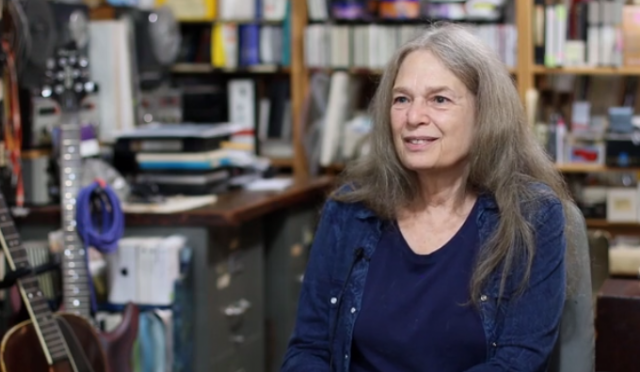
Electronic music pioneer Laurie Spiegel is featured in this new video interview by Frank J. Oteri, via NewMusicbox.
Spiegel is an American composer and visual artist, best known for her electronic compositions. Her work has explored modular synthesis, computer music, algorithmic composition and ‘intelligent instruments’.
Her 1980 debut album, Expanding Universe, includes music that traveled to space with the NASA Voyager. Her Obsolete Systems features Spiegel’s works for systems that many would now consider ‘obsolete’, like the Bell Labs GROOVE digital audio synthesizer, Apple II & Electrocomp 100 modular synthesizer. She documents her work with these systems at her site.
Spiegel began her musical life as a folk guitar player and has never abandoned that music. But she fell in love with machines the first time she saw a mainframe tape-operated computer at Purdue University, on a field trip there with her high school physics class, and has been finding ways to humanize them in her own musical compositions and software development ever since.
Spiegel sees common ground between the aesthetics of folk traditions and the digital realm. In this new interview, she talks about how she sees the computer as a folk instrument.
“The electronic model is very similar to the folk model,” says Spiegel. “People will come up with new lyrics for the same melody, or they’ll change it from a ballad to a dance piece. Nobody can remember what the origin is. There is no single creator. People sample things, they do remixes or sampling, they borrow snatches of sound from each other’s pieces. The concept of a finite fixed-form piece with an identifiable creator that is property and a medium of exchange or the embodiment of economic value really disappears.”
In her acceptance speech for the 2013 SEAMUS Award, Spiegel offered this perceptive on electroactoustic music and her place in its history:
“I have worked in this field quite a long time and seen incredible changes, including the transition of many sounds and techniques from unique cutting edge instances to ubiquitously available resources. All those sounds and techniques that were once thought so strange then later came to be so widely accepted, they are not the real essence of what we are doing, what still sets us apart as electroacoustic composers.
They are artifacts of what we have done, a trail we have left, not the essence of our process.
What we do is inhabit the extreme edges of the known sonic universe, to dwell there and listen, to find and reveal or realize what may be there, to postulate and to populate those spaces, to listen openly to our individual imaginations and sonic sensations, to feel for what is so subtle or so complex or so fundamental or so authentically meaningful that it still evades being focused on, captured, described, expressed or shared.”

Such exceptional talent. A true synth player with a searching yet precise methodology.
The so called modern artists and superstar producers would do well to learn by her example!